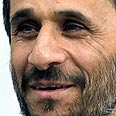
King of nuclear bluff
Despite Iran’s doubtful nuke progress, Ahmadinejad’s nuke blackmail is hugely successful
The declarations made by French Foreign Minister Bernard Kouchner and the speech delivered by French President Sarkozy at the UN placed the military strike option against Iran on the agenda. Therefore, we must seriously examine the progress made in the Iranian nuclear project.
Since 2003, it has been argued that the Iranian nuclear plan is premised on uranium enrichment. Yet the process involved in this is lengthy, exhausting, and requires an intense effort by thousands of professionals and many thousands of centrifuges activated in perfect harmony. Are the Iranians capable of it?
Theoretically, the answer is positive, yet they must succeed where others have failed: About 60 years ago, the United States failed in its efforts and shifted to producing the uranium required for a bomb (U-235) through the electromagnetic separation of isotopes. In addition, reports that the Iranians purchased enriched uranium in Pakistan were never confirmed.
The existence of Iranian problems when it comes to uranium enrichment has also been confirmed by International Atomic Energy Agency inspectors, as well as by Israeli sources in the know.
However, uranium is not the only option for building a nuclear bomb. It is “easier” to use plutonium as the required critical mass is much lower (2-3 kilograms, as opposed to about 50 kilograms of uranium.) However, the required detonator is incredibly more complex than the one needed for uranium. Moreover, in order for a third-world country like Iran to successfully apply the knowledge and build a plutonium bomb, it requires great help from external sources and, first and foremost, it needs plutonium – a material that does not exist in nature. For a long time, the Russians built a plutonium-based nuclear power station in Bushehr, but in the wake of heavy American and Israeli pressure, they abandoned the project at the end of 2006.
Ahmadinejad impresses Sunni world
Another option available to Iran at this time is the use of heavy water that makes it possible to maximize plutonium production. According to reports, the Iranians are now considering the construction of a nuclear reactor for “research purposes” in Arak, where a heavy water plant already exists and the construction of a plutonium production plant is moving ahead with Russian help.
In principle, this is a major risk factor, yet we are only talking about a long-term threat, as Iran will find it difficult, and maybe impossible, to cope with the required technologies without assistance. The Iranian boastfulness over apparent achievements in the area of thermonuclear energy confirms the estimates that it does not have top-notch scientists or enough technicians. Moreover, it does not possess the required resources or infrastructure.
Unfortunately, there is always the possibility that the Iranians will choose to use a “dirty bomb”- a conventional warhead equipped with radioactive materials. Building it does not require a broad infrastructure, and the needed radioactive material is widely available across the world.
In such case, there will not be a nuclear explosion or a chain reaction, yet the detonation of the conventional warhead will spread radioactive materials in the air – a similar effect to the one created by chemical weapons.
Does this imply that the Iranians will not be able to cause damage in the next five to seven years, until they possess operational nuclear weapons? And if so, can we ignore Iranian nuke sites, and moreover, give up on the idea of destroying them? The answer is negative.
This is the case, first and foremost, because despite the doubts regarding Ahmadinejad’s substantial accomplishments when it comes to nuclear weapons, he enjoys unprecedented success in the area of nuclear blackmail. Moreover, he is he king of the nuclear bluff. His great success does not come in the form of scaring the Americans or Israelis, but rather, the impression he creates across the Sunni world.
Conservative Sunni leaders across the Arab world, ranging from Egyptian President Mubarak to the Saudi royal family, are scared. They estimate that Iran is close to acquiring nuclear capabilities that would bring with it Islam’s ultimate victory over the infidels. This impression is what turned the Persian Shiite leader into a hugely popular and powerful figure in the eyes of the Sunni masses. Arabs and Muslims, both radicals and moderates, approach Ahmadinejad’s unfounded bluff with complete seriousness.
Dr Alexander Libin is a political commentator and Dan Shapira is a Near Eastern History lecturer at Bar Ilan University










